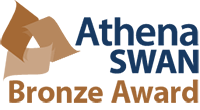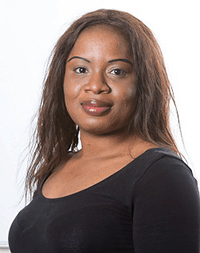
School of Health and Social Work.
Dr Faith Ikioda
“You Have to be determined if you are to make something happen. You need to take responsibility and learn. Knowledge is power.”
I was good at Science at school and ended up completing a BSc in Geography in Nigeria. However, I graduated feeling very disillusioned. It was a long course, not aided by the constant striking at the time. By the time it had finished, I didn’t see the point of it as I felt had only gained theoretical knowledge and had no practical experience.
At this point, I came to the realisation that humans are more important than mountains, and in 2006 I started an MA in Human Geography. My dissertation focused on food identities amongst Nigerian families in Manchester. It was a steep learning curve as the course focused on qualitative analysis and had a post-modernist flavour to it; I was more familiar with quantitative methods; I found it very hard in the beginning, especially since I had to move countries and adjust to a new culture. I was the only student studying full-time on the course and found myself taking electives in other departments so as not to feel too lonely. At the end of the course, I felt I really wanted to focus more on research, so I applied for a PhD. Someone from Sheffield recognised the value of my research and saw the potential in my work. I was offered a partially-funded PhD studentship and had to work hard to pay the rest of the fees which at the time were £8,000 per year. I worked part-time in a clothes store and absolutely hated it!
At the end of my first year, a colleague told me about a funding body: The Foundation for Urban and Regional Studies. My two supervisors at the initial start of my PhD research also asked me to apply for a scholarship: the WINGATE scholarship, offered by a trust held by a family wanting to support women pursuing academic careers. Following interviews, I received both scholarships which amounted to £30.000. I was thrilled. The funds really helped and I consider myself very lucky because funding opportunities for international students can be very competitive and hard to come by for postgraduate research This meant I could concentrate on studying and not work so much as the work was not related to my field of study. My University (The University of Sheffield) was very supportive. I had three female supervisors towards the end of my PhD research, one of whom was an Afro-Caribbean Lecturer in the Faculty and her presence felt like a breath of fresh air. She was a wonderful role model. All three of my supervisors combined a range of work-life experiences (including maternity leave and a sabbatical to Hong Kong) and we worked really well together.
When you are an international student, it is almost impossible to get a job in the UK. The jobs were there, but not for me. Many application forms ‘closed down’ once you revealed that you were an international student. The University of Hertfordshire didn’t have one of the ‘closing down’ features and, following my application, I attended an interview for a job within the Centre for Research in Primary and Community Care (CRIPACC) at the School of Health and Social Work. It was my first interview for an academic job. The panel members were eager to hear what I had to say. The interview was on Friday, and on Monday I got the call informing me that I had got the job. It was fixed term for two years and was meant to end last year in June. However, following a seminar I did for CRIPACC, Dr Wendy Wills, who is the School’s Athena SWAN Champion, approached me inviting me to write a bid. I was stunned when she asked me. I didn’t think I had the experience, but Wendy thought I had the ability. We were awarded the funding: £250.000.

The current project I am working on ends in September 2016. I have asked to become module leader for the MA in Clinical Research and I am also constantly talking about future bids with colleagues. If I leave, I will have built up my CV: I have sat on a recruitment panel, attended research committees, been involved in public engagement and am a member of the Athena SWAN Self-Assessment Team (SAT).
The nature of having a fixed-term contract means that it is hard to do what you want i.e. I can’t currently supervise PhD students or be a Principal investigator on a bid. I am currently looking into progressing to Senior Research Fellow.
CRIPACC, the Research Centre I work in at the University, is an amazing place to work. I feel that people come to you, talk to you, then what they suggest becomes a reality. Everyone is supportive and approachable. Nobody feels there is a hierarchy. I have a wonderful sense of independence and work flexibly. It has been a wonderful place to start my career.




Leave a Reply